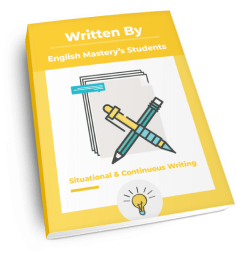
3 Tips to Keeping a Vocabulary Notebook
Remember those primary school days when you had a weekly spelling test?
Learning to spell new words accurately was a big part of English lessons.
However, have you noticed that you no longer are learning new words intentionally now that you are in Secondary School?
I’d like to assure you that you should never stop learning new words – even if you are an English teacher like me!
In this blog, I’m going to show you 3 tips to keeping vocabulary notebook.
The KEY to keeping a vocabulary notebook is that your entries have to make sense to you.
We are going to use the word “backlash” as an example.
1st: Word Class
The first step is to notice the word class of the word. Some examples of word class include nouns, adjectives and verbs.
If you have never heard of them, hang in here and have patience to learn them in this post because word classes are the foundational blocks of the English language!
Here are some definitions to help you recall what you may have already learned in primary school.
Helpful Word Class Definitions
• A Noun is a word that is the name of something (such as a person, animal, place, thing, quality, idea, or action). Some examples include John, Anna, elephant, Marina Bay Sands and happiness.
• An Adjective is a word that describes a noun. It gives information like the size, shape, age, colour, origin or material of the noun. E.g. It is a yellow notebook. The adjective is “yellow” because it describes the colour of the noun “notebook”.
• A Verb tells you what action or state the noun is it. Verbs are the only kind of word that carry tenses.
E.g. John kicked the rubber ball. “Kicked” is the verb and it is in past tense.
Got the gist? Okay, enough of word classes.
Now, let’s come back to the word “backlash” in the Macmillan Dictionary.

Did you notice that it is a noun? A good dictionary will tell you the word class of the word you are searching for.
Knowing this word is a noun gives you a clear idea of how this word should be used in your sentence.
For instance, you can add adjectives in front of the word “backlash” since you can use adjectives to describe nouns.
Adjective + Noun
- political backlash
- domestic backlash
2nd: Meaningful Definition
Next, take time to find three to four definitions of the same word.
Why? You need to find a definition that makes sense to you. A good definition will make a big difference to your understanding of the word.
Here are 3 different definitions of the word “backlash”. Which is your favourite?
Macmillan
A strong, negative, and often angry reaction to something that has happened, especially a political or social change.
Oxford
A strong negative reaction by a large number of people, especially to a social or political development.
Vocabulary.com
When many people react against something in the same way, you can call it a backlash. A backlash against government policies can result in mass protests.
My personal favourite is from Vocabulary.com because it is easy to understand. It also includes an example of how a backlash against government policies can cause mass protests.
Examples can be very crucial to your understanding of the new word.




